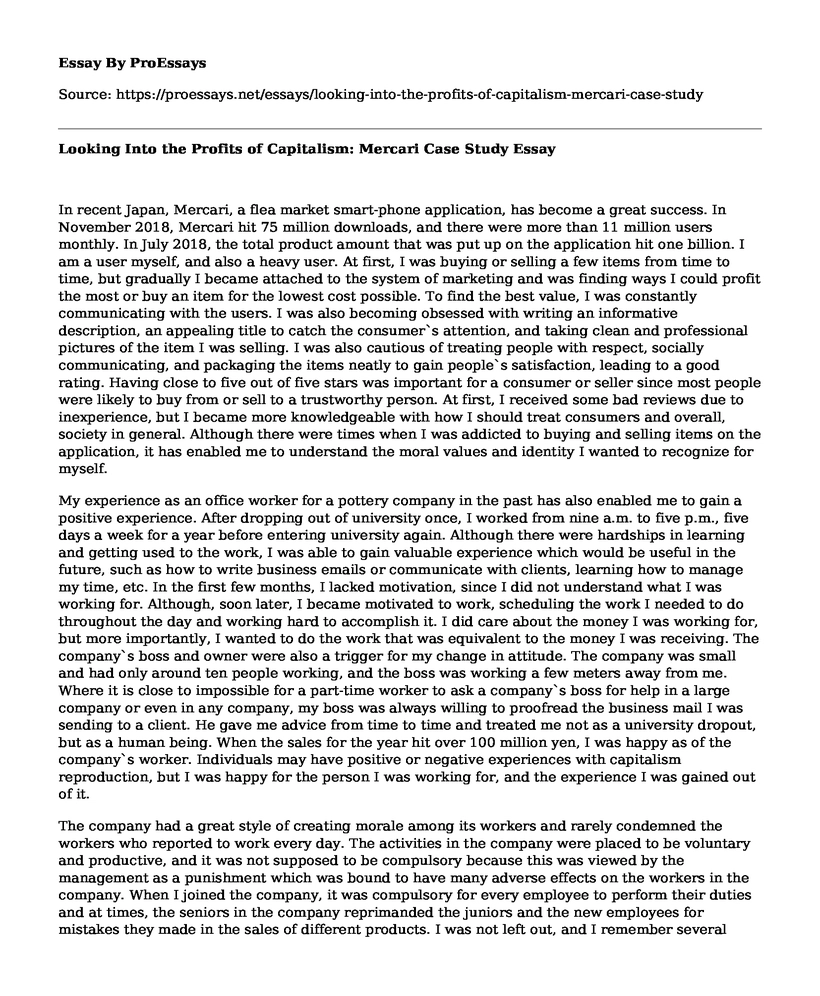In recent Japan, Mercari, a flea market smart-phone application, has become a great success. In November 2018, Mercari hit 75 million downloads, and there were more than 11 million users monthly. In July 2018, the total product amount that was put up on the application hit one billion. I am a user myself, and also a heavy user. At first, I was buying or selling a few items from time to time, but gradually I became attached to the system of marketing and was finding ways I could profit the most or buy an item for the lowest cost possible. To find the best value, I was constantly communicating with the users. I was also becoming obsessed with writing an informative description, an appealing title to catch the consumer`s attention, and taking clean and professional pictures of the item I was selling. I was also cautious of treating people with respect, socially communicating, and packaging the items neatly to gain people`s satisfaction, leading to a good rating. Having close to five out of five stars was important for a consumer or seller since most people were likely to buy from or sell to a trustworthy person. At first, I received some bad reviews due to inexperience, but I became more knowledgeable with how I should treat consumers and overall, society in general. Although there were times when I was addicted to buying and selling items on the application, it has enabled me to understand the moral values and identity I wanted to recognize for myself.
My experience as an office worker for a pottery company in the past has also enabled me to gain a positive experience. After dropping out of university once, I worked from nine a.m. to five p.m., five days a week for a year before entering university again. Although there were hardships in learning and getting used to the work, I was able to gain valuable experience which would be useful in the future, such as how to write business emails or communicate with clients, learning how to manage my time, etc. In the first few months, I lacked motivation, since I did not understand what I was working for. Although, soon later, I became motivated to work, scheduling the work I needed to do throughout the day and working hard to accomplish it. I did care about the money I was working for, but more importantly, I wanted to do the work that was equivalent to the money I was receiving. The company`s boss and owner were also a trigger for my change in attitude. The company was small and had only around ten people working, and the boss was working a few meters away from me. Where it is close to impossible for a part-time worker to ask a company`s boss for help in a large company or even in any company, my boss was always willing to proofread the business mail I was sending to a client. He gave me advice from time to time and treated me not as a university dropout, but as a human being. When the sales for the year hit over 100 million yen, I was happy as of the company`s worker. Individuals may have positive or negative experiences with capitalism reproduction, but I was happy for the person I was working for, and the experience I was gained out of it.
The company had a great style of creating morale among its workers and rarely condemned the workers who reported to work every day. The activities in the company were placed to be voluntary and productive, and it was not supposed to be compulsory because this was viewed by the management as a punishment which was bound to have many adverse effects on the workers in the company. When I joined the company, it was compulsory for every employee to perform their duties and at times, the seniors in the company reprimanded the juniors and the new employees for mistakes they made in the sales of different products. I was not left out, and I remember several cases where I faced such reprimand. This always brought down my morale, and most of the time led me to think about quitting.
As time moved, new management was realized in the company, and with it, new ideas were created, which played a major role in the change of the employee's perceptions and ways of treating others. The capitalism levels improved, and I have realized a major change in the way employees are treated in the company as compared to the beginning of my work days. The drastic change in the style of treatment of new employees required a lot of human effort to work together and ensure that every employee in the company was contented with what they were doing. The boss I was working for ensuring that each person in the company was equal despite the experience and skills they had, and he ensured that no employee had the right to see the other as an inferior who could be ordered around the company. This brought a sense of equality between all employees and the sales in the company rose to high levels within a short period due to the unity that came about from such equality.
Cite this page
Looking Into the Profits of Capitalism: Mercari Case Study. (2022, Feb 18). Retrieved from https://proessays.net/essays/looking-into-the-profits-of-capitalism-mercari-case-study
If you are the original author of this essay and no longer wish to have it published on the ProEssays website, please click below to request its removal:
- Management Essay Sample. William Henry Gates: Leadership in Microsoft
- Essay Sample on Mickey Mouse Monopoly
- Employment Laws, Policies and Processes Essay Example
- Talent Management: Recruiting, Hiring, Training & Retaining Talent - Essay Sample
- Apple Inc: Analyzing Its Global Performance and Impact - Essay Sample
- Essay Example on Amazon vs Walmart: Who Wins the Price War?
- Paper Example on Minimum Wage: Protecting Workers from Unfair Pay







